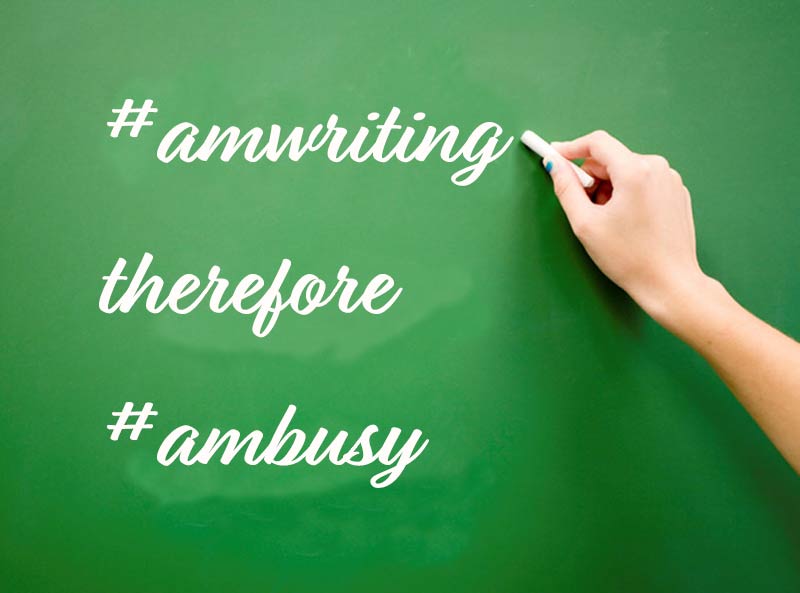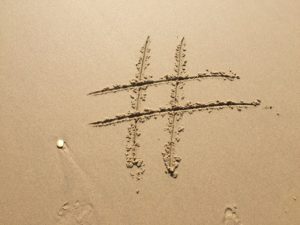
One of my friends, Chris Messina, actually invented the hashtag back in 2007, the same year that social media went mainstream. Here was his tweet:
How do you feel about using # (pound) for groups. As in #barcamp [msg]?
A few years ago I asked him to co-author a book with me, but that’s another story.
Considered nerdy at first, and even resisted by the Twitter brass, the humble hashtag (what we used to call a pound or number sign) quickly caught on and helped people give form and structure to the free-form firehose of tweets coming at us from all quarters. Now you could hop into a conversation and share your knowledge or spout off without knowing any of the parties involved. It helped enable the online townsquare.
In short, hashtags brought some degree of order to the chaos of social media.
Hashtags quickly migrated to other social platforms: Facebook (where posts with hashtags are still something of a rarity), LinkedIn (where hashtags are now part of the posting process), YouTube, Reddit and Instagram (where the top Instagrammers load their updates with a couple of dozen hashtags).
Authors can use hashtags to discover conversations about topics relevant to your fiction writing or research, and then engage with thought leaders on the subject — or just shoot the breeze with regular folks. Everyone loves talking with an author.
Here’s a guide to the best hashtags to use on each platform if you’re an author or want to engage with authors. (In case you’re wondering, upper-lowercase or all lowercase doesn’t make any difference.)
Here are some of the most popular hashtags to use on Twitter (I’m @jdlasica and we’re @authorsai, by the way — follow us and we’ll follow you back):
 #amwriting: the all-around hashtag used to signal writing-related updates
#amwriting: the all-around hashtag used to signal writing-related updates
#writerslife: often used in the same way but with a bias toward updates about the writer’s lifestyle, home life or work environs
#writingcommunity: when writing about subjects of interest to the community at large
#writing: anything writing-related
#authors: anything related to authors
#writerlift: Here’s a hashtag where writers are encourage to promote their Twitter account and attract new followers.
#fiction or #nonfiction: just what you’d think
#indiepublishing #indieauthor and #selfpublishing: if this applies to you
Related hashtags
And, of course, genre-specific topics such as:
#romance (though some non-literary updates add to the mix)
#urbanfantasy and every other subgenre
Where it’s generally a good idea to keep your tweets to three to five hashtags max, the culture of Instagram is to encourage prolific use of hashtags … because discoverability is the entire point. Hashtags are likely used much more widely on Instagram than anywhere else on the Web, owing to the fact that you get a ready-made and often engaging visual collage of updates about a subject.
Instagram imposes a limit of 30 hashtags per post, but some Instagrammers are getting around it by posting more hashtags in the comments. (Me? I think 30 is plenty.) Some popular ones:
#authorsofinstagram: 3.9 million posts
#writersofinstagram: 24 million posts
#writerscommunity: 8.5 million posts
#writingcommunity: 7 million posts
#bookstagram: 45 million posts
#bookworm: 19 million posts
#bookish: 9 million posts
#booknerd: 8.9 million posts
#bookstagrammer: 6.4 million posts
#booksofinstagram: 5 million posts
#spilledink: 5 million posts
#novel: 4 million posts
#amwriting: 3.5 million posts
And many more:
#bookstagrammersunite
#readersfirst
#booknerd
#booklove
#bookshelf
#bookobsessed
#currentlyreading
#ilovebooks
#ireadbooks
#readers
#amreading
#iamareader
#readersofig
#readersofinsta
#readersgonnaread
#bookclub
#bookreviewers
#bookbloggers
And genre-specific:
#thrillers
#thrillerbooks
#ireadthrillers
#thrillerbookstagram
#ireadyafantasy
#yafantasybookstagram
#yabookstagram
#fantasybookstagram
#murdermystery
You get the idea.
LinkedIn has become a thriving platform for dozens of author groups. When you post an article or update, the service encourages you to add hashtags. LinkedIn hashtag suggestions include #authors, #authors, #authorlife, #authorsofinstagram (but not #authorsoflinkedin), #authorslife, #authorsofig, #authorship and #authorpreneur.
While Twitter is a public townsquare, Facebook is a confederation of millions of private enclaves. That means if you use a hashtag inside a private group, it won’t be seen by the public. If you use it on your timeline and your default setting is to show your posts only to friends and family, it won’t be seen by the public.
But some people do use Facebook to spark and engage in public discourse, so go for it! … when you’re on a public page. If you have an author page on Facebook, presumably you’ve made it public. You’ll find some examples here:
You’ll notice you can’t embed your Facebook post with a hashtag to your blog, because that’s how Facebook rolls. It’s a walled garden that exploits the Web but doesn’t give back.
Add your own hashtags
What have I missed? Likely many of your favorite hashtags. We’ll make this article evergreen, so please chip in your additions in the comments below to help your fellow authors get more visibility. And keep on tagging!







I like #writers and #selfpublishing on LinkedIn too – always learning!